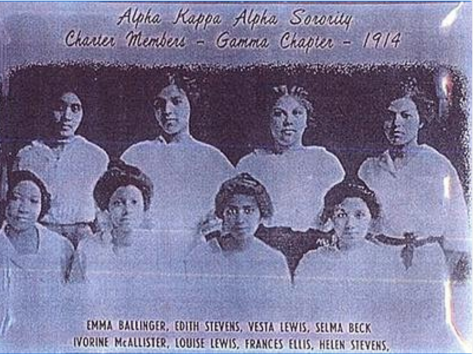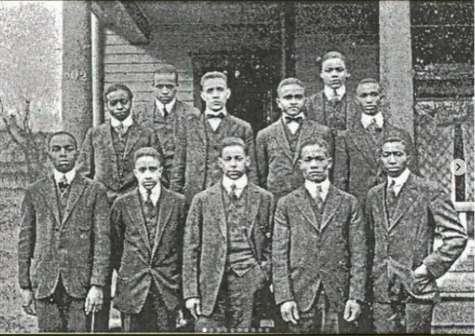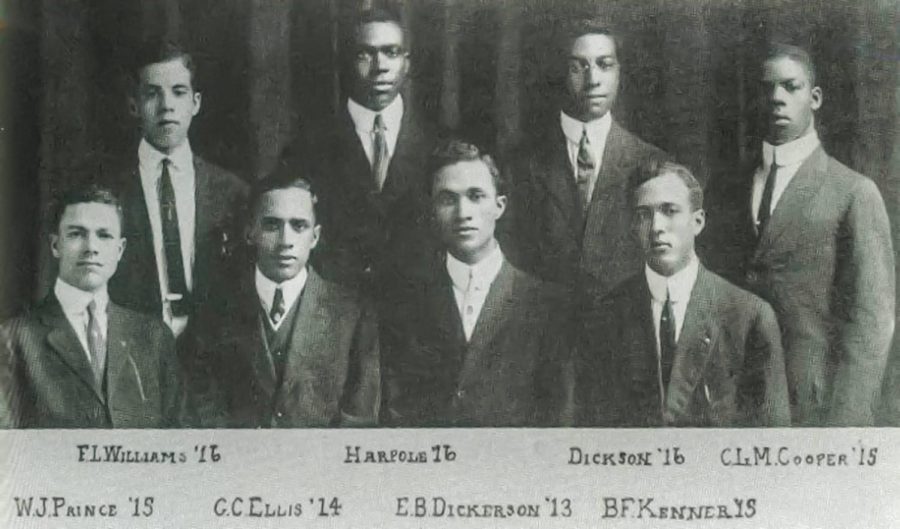Making a home: Black Greek life on campus
Photo courtesy of the Greater Beta Chapter of Kappa Alpha Psi Website
Members of the Kappa Alpha Psi Fraternity, Incorporated, at the University of Illinois pose for a photo in 1913. Black Greek life was created for Black students to have a safe space to live and socialize on campus.
January 19, 2022
Up until 1945, Black students at the University were not permitted to live on campus. They were forced to live in the north end of Champaign where community members would house the small number of students that the University accepted.
However, African American students made it possible to earn their education while living on campus by establishing their own housing. Those that were affected and displaced by the racially divisive system came together to create a space of their own: Greek Life.
Black fraternities and sororities at the University have been an inclusive space for over 100 years. Historically, they provided housing for Black students when the University would not.
Ashley Dye, director of Fraternity and Sorority Affairs, explained that the University closely followed in the footsteps of other universities as several African American Greek houses were formed.
“Really early on in the formation of Black Greek life nationwide was the start of Black Greek life at Illinois,” she said.
Get The Daily Illini in your inbox!
In 1908, Ethel Hedgeman and eight other Black female students at Howard University founded the first Greek-letter organization for African American women: Alpha Kappa Alpha.
Five years later, the Gamma Chapter of AKA was officially chartered at the University of Illinois on Feb. 12, 1914. This marked the beginning of Black Greek life on campus.

Kaamilyah Abdulla-Span, director of Campus Culture and Climate and previous graduate adviser for Alpha Kappa Alpha, said AKA made, and still makes, underrepresented women feel less alone.
“The founders wanted Black women to band together,” she said. “They needed a community in order to make sure they existed not only on this campus but subsist as well.”
One instrumental alumnus from AKA and a trailblazer for Black women at the University was Maudelle Tanner Brown Bousfield. She was a member of the Theta Omega graduate chapter and the sixth national president of Alpha Kappa Alpha Sorority, Inc. She was the first African American woman to graduate from the University.
“She set the standard and what we should be looking up to and should be striving to do and making sure that we’re also helping those around us,” said Sharon Nduka, senior in AHS and president of Alpha Kappa Alpha. “She made sure that she was there helping when it came to the retention of Black women on campus.”
The oldest Black fraternity at the University, Kappa Alpha Nu, was originally founded in 1911 at the University of Indiana by several Black men such as Elder Watson Diggs.
On Feb. 8, 1913, several members of the Alpha Chapter in Indiana traveled to Urbana to charter the Beta Chapter of Kappa Alpha Nu, later known as Kappa Alpha Psi in 1915. KAP was the first Black fraternity on campus.
The brothers consisted mostly of members of the Illio Club that was presided by Earl B. Dickerson. Dickerson would later become KAP’s Polemarch.
KAP’s reach was so large that during the civil rights movement, they had the most members of any Black Greek organization in the country.

In 1906 at Cornell University, seven Black men known as “The Seven Jewels” recognized the need for a space for African American men in higher education. They then established the Alpha Phi Alpha fraternity.
At the University, the Beta Phi fraternity was granted a charter into Alpha Phi Alpha and thus became the Tau Chapter on March 23, 1917.
Devin Munoz, senior in AHS and president of Alpha Phi Alpha, said Black Greek life changed the University.
“It was really a shift in culture because before there weren’t any fraternities, there weren’t groups for young Black men coming in college,” he said.
For many Black students, Greek life became a support system and a crucial part of campus life that continues to be an inclusive space for many.
Abdulla-Span commented on the responsibilities and lasting impact of Black Greek life.
“We have a responsibility to the students,” she said. “We are serving to make sure that they feel as though they are supposed to be here. Black Greek-letter organizations are unique in that it’s not just a collegiate experience, but for some, it may not be a collegiate experience at all.”
Munoz explained how he felt that his fraternity changes those who pledge to it.
“For me, Black Greek life is something that enhances you in a sense,” he said. “When students join, they only become a more positive version of themselves.”
Nduka corroborated that she too found a sense of security with her sisters at Alpha Kappa Alpha.
“Whatever I have going on, I feel like I can turn to my sisters,” she said. “There’s just always kind of people out there who are looking out for you and making sure that if they can help you, that they will.”







